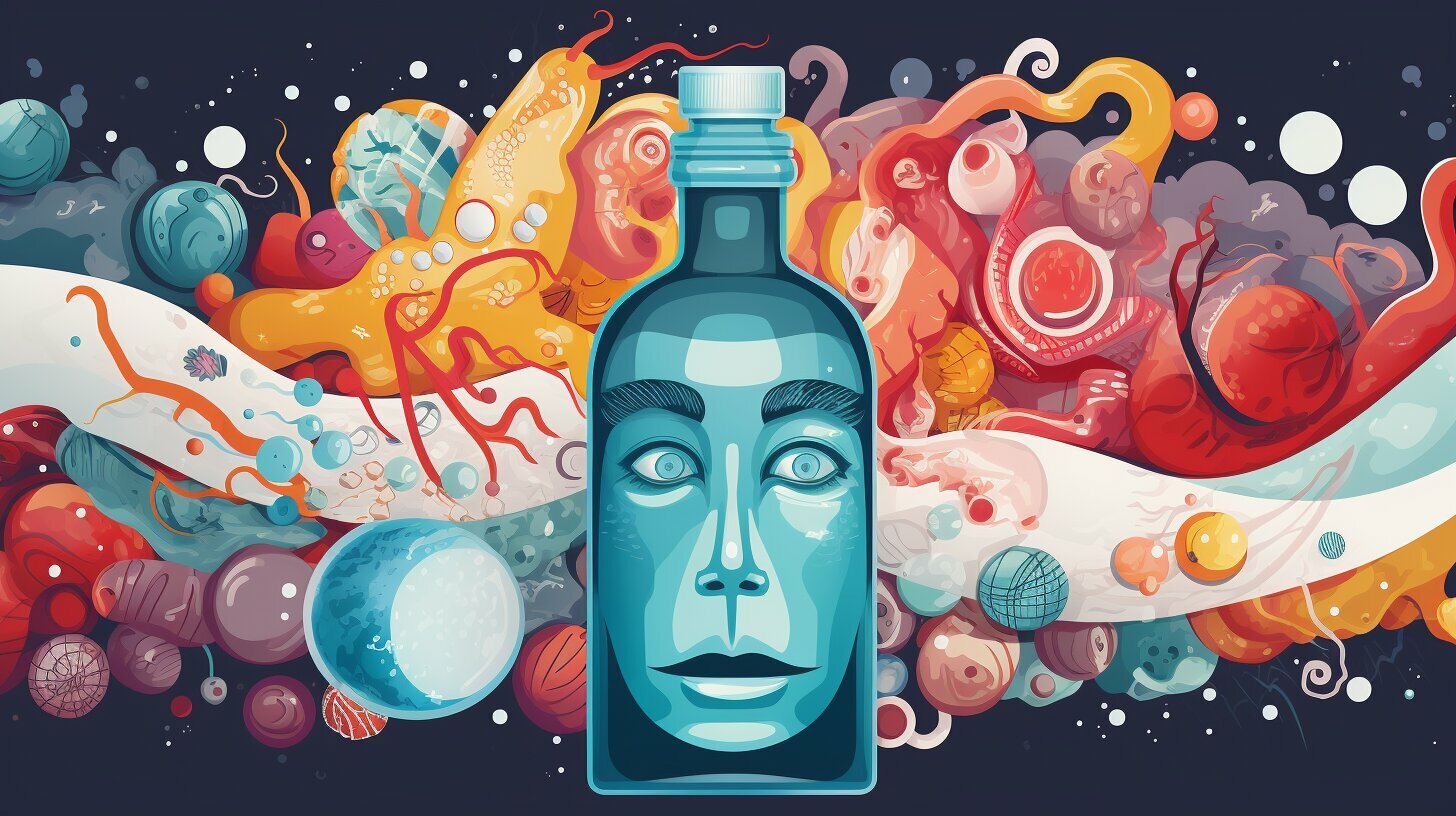Unraveling the Mystery: Why Does Medicine Taste Bad?
Have you ever wondered why medicine often tastes bad? The unpleasant taste of medicine can be attributed to a variety of factors, including the active ingredients, formulation, and method of administration. Bitter compounds or excipients added to the medication can contribute to the unpleasant taste experienced when taking medicine. Additionally, individual taste buds vary, making it challenging to create universally appealing medications that are palatable for everyone.
The taste of medicine has long been a concern for both patients and healthcare professionals. It’s no secret that many medications have a bitter or foul taste, which can make it difficult for individuals, especially children, to take them as prescribed. However, there are alternative approaches and solutions available to address this issue and improve the overall experience of taking medicine.
Key Takeaways:
- Bitter compounds and excipients added to medication can contribute to the unpleasant taste of medicine.
- Individual taste buds vary, making it challenging to create universally appealing medications.
- Compounding pharmacies offer alternative formulations and delivery methods to make medicine more palatable.
- Flavoring can be added to medications, especially for children, to enhance taste and acceptability.
- Encapsulating medicine in microspheres can prevent taste and irritation, improving medication adherence.
Factors Affecting Medicine Taste
The taste of medicine can be influenced by a combination of factors, including the active ingredients, formulation, and method of administration. These factors contribute to the bitter or foul taste experienced when taking certain medications.
One of the main reasons for the unpleasant taste of medicine is the presence of bitter compounds or excipients that are added to enhance stability or improve drug delivery. These compounds can interact with taste receptors on the tongue, resulting in a bitter taste sensation. Additionally, some medications have inherently bitter active ingredients, which further contribute to the unpleasant taste.
Individual taste buds also play a significant role in the perception of medicine taste. Taste preferences vary among individuals, making it difficult to create universally appealing medications. What may taste tolerable to one person might be repulsive to another. Therefore, the challenge lies in developing medications that strike a balance between taste and therapeutic effectiveness.
| Factors | Impact |
|---|---|
| Active Ingredients | Can contribute to the bitter taste of medicine |
| Formulation | Includes the choice of excipients and additives that can affect taste |
| Method of Administration | Can influence the taste experience, such as swallowing tablets or taking liquid medications |
To address the issue of unpleasant medicine taste, compounding pharmacies offer alternative approaches to improve taste and enhance medication compliance. They can customize formulations by removing or replacing specific ingredients that contribute to the bitter taste. By tailoring the medication to an individual’s taste preferences, compounding pharmacies can make medicine more palatable and increase patient adherence.
Furthermore, flavoring can be added to medications, especially for children, to make them more enjoyable. However, it is crucial to balance taste with therapeutic absorption. Some flavoring agents may interact with the medication, affecting its effectiveness. Therefore, it is essential to consult with a healthcare professional before adding flavoring agents to ensure compatibility and avoid potential interactions.
Key Points:
- The taste of medicine can be affected by active ingredients, formulation, and method of administration.
- Bitter compounds or excipients can contribute to the unpleasant taste of medicine.
- Taste preferences vary among individuals, posing a challenge in creating universally appealing medications.
- Compounding pharmacies offer customized formulations and flavoring to improve taste and enhance medication compliance.
- Consulting with a healthcare professional is important to ensure compatibility and avoid potential interactions when adding flavoring agents to medications.
Challenges in Creating Palatable Medications
Creating a medication that pleases everyone’s taste buds can be a real challenge. The taste of medicine can often be unpleasant due to various factors, such as the active ingredients, formulation, and method of administration. Bitter compounds or excipients added to the medication can contribute to the unfavorable taste. Additionally, individual taste buds vary, making it difficult to develop universally appealing medications.
Compounding pharmacies provide alternative approaches to improve the taste of medicine. They can offer customized formulations or alternative delivery methods, catering to individual taste preferences. By tailoring the medication to each person’s unique needs, compounding pharmacies strive to make medicine more palatable and increase patient adherence.
One solution to improve the taste of medicine, especially for children, is the addition of flavoring. This can make medications more enjoyable and increase compliance. However, it is important to strike a balance between taste and therapeutic absorption. Too much flavoring can interfere with the medication’s effectiveness, while too little may not mask the unpleasant taste.
Microspheres for Taste Prevention
Another innovative approach to address the unpleasant taste of medicine is the use of microspheres. these tiny particles can encapsulate the medication, preventing taste and irritation. By creating a protective coating around the active ingredients, microspheres allow for improved palatability while maintaining therapeutic efficacy. In addition to the taste benefits, microspheres can also enhance medication adherence, as they reduce the likelihood of experiencing bitter aftertastes or irritations.
Despite the challenges in creating palatable medications, there are alternative methods and formulations available that can help improve the taste of medicine. However, it is essential to consult with a healthcare professional to ensure compatibility and avoid any potential interactions. By working together with patients and healthcare providers, we can find the best solution to overcome the medicine flavor problem and enhance the overall medication experience.
Alternative Approaches to Improve Taste
There are alternative approaches to improve the taste of medicine, especially for those who struggle with the unpleasant flavor. Compounding pharmacies play a crucial role in this process by offering customized formulations and alternative delivery methods. By tailoring medications to individual preferences, compounding pharmacies help ensure patient satisfaction and adherence to prescribed treatments.
One effective method employed by compounding pharmacies is the addition of flavoring agents. By incorporating pleasant flavors into medications, the bitter taste can be masked, making it more palatable for patients, especially children. This approach not only increases patient acceptance but also improves medication compliance, as individuals are more likely to take their medicine as prescribed when it tastes better.
However, it is important to strike a balance between taste and therapeutic absorption. Compounding pharmacies carefully consider the compatibility of flavoring agents with the active ingredients to ensure optimal drug delivery and effectiveness. This attention to detail highlights the importance of consulting with healthcare professionals who can guide patients in finding the best solution for their taste-related medication issues.
Customized Formulations and Alternative Delivery Methods
Compounding pharmacies specialize in creating personalized medications to meet individual needs. By customizing formulations, they can modify the taste and texture of medicine according to patient preferences. For example, a medication that is typically available in tablet form can be compounded into a liquid or lozenge, making it easier to swallow and potentially improving the taste.
In addition to customized formulations, alternative delivery methods can be explored. Compounding pharmacies can offer medications in different forms, such as transdermal gels, nasal sprays, or sublingual tablets. These alternative routes of administration can bypass the taste buds, minimizing the unpleasant taste experience while ensuring effective drug absorption.
Overall, the availability of alternative approaches through compounding pharmacies provides hope for individuals who struggle with the taste of their medications. By working closely with healthcare professionals, patients can explore options to enhance the palatability of their prescriptions and ultimately improve their treatment experience.
| Benefits of Alternative Approaches to Improve Taste: |
|---|
| Customized formulations tailored to individual preferences. |
| Flavoring agents to mask the unpleasant taste of medications. |
| Alternative delivery methods to bypass taste buds. |
| Improved medication compliance and adherence. |
Microspheres for Taste Prevention
Microspheres can revolutionize the way we take medicine. These tiny particles, typically ranging in size from a few micrometers to a millimeter, are designed to encapsulate medications, preventing taste and irritation. This innovative approach not only addresses the issue of foul-tasting medicine but also improves medication adherence.
One of the main challenges in medicine is the unpleasant taste of certain medications. The bitter compounds or excipients added to enhance stability or aid in drug delivery can make swallowing medicine a daunting task. However, by encapsulating the medicine in microspheres, the taste is masked, ensuring a more palatable experience for patients.
Moreover, microspheres offer an added advantage by controlling the release of the medication. These tiny spheres can be formulated to release the drug in a controlled manner, ensuring the desired therapeutic effect while minimizing side effects. This not only improves the tolerability of the medication but also enhances its efficacy.
In addition to taste prevention, microspheres also contribute to better medication adherence. The use of microspheres prolongs the drug’s presence in the body, reducing the frequency of dosing. This can be particularly beneficial for patients who have difficulty adhering to complex medication regimens. By simplifying the dosing schedule, microspheres help increase patient compliance and improve treatment outcomes.
| Advantages of Microspheres for Taste Prevention |
|---|
| Mask unpleasant taste of medication |
| Controlled release of the drug |
| Improved medication adherence |
While microspheres offer great promise in revolutionizing the way we take medicine, it’s important to consult with healthcare professionals to determine the best course of treatment. Each individual’s taste preferences and therapeutic needs may vary, and a personalized approach is necessary to ensure optimal results.
Customized Formulations and Delivery Methods
Compounding pharmacies provide innovative solutions to address taste issues. These pharmacies specialize in creating customized formulations and alternative delivery methods that cater to individual taste preferences. By working closely with healthcare professionals, compounding pharmacists can offer personalized options to make medication more palatable.
One approach is through customized formulations, where pharmacists can modify the active ingredients or excipients in the medication to reduce bitterness or unpleasant taste. They can also utilize flavoring agents to enhance the overall taste, particularly for medications intended for children. Compounding pharmacies have a wide range of flavors available, from fruity to minty, ensuring that the medication becomes more enjoyable to take.
Another option is alternative delivery methods, which allow patients to take their medication in a different form. For example, a compounding pharmacist can create a transdermal gel or cream for individuals who have difficulty swallowing pills or capsules. This provides a convenient and effective way to administer the medication without sacrificing taste.
Table: Examples of Customized Formulations and Alternative Delivery Methods
| Customized Formulations | Alternative Delivery Methods |
|---|---|
| Flavoring agents to mask bitter taste | Transdermal gels or creams |
| Modified active ingredients or excipients | Oral suspensions or liquid formulations |
| Unique combinations of ingredients | Sublingual tablets or lozenges |
It is important to note that while compounding pharmacies offer these solutions, the process of balancing taste with therapeutic absorption can be challenging. The customized formulations or alternative delivery methods should be carefully evaluated by healthcare professionals to ensure compatibility and to avoid any potential interactions with the medication.
In conclusion, compounding pharmacies play a crucial role in improving the taste of medication through customized formulations and alternative delivery methods. By working closely with healthcare professionals, patients can find innovative solutions that make taking medicine a more pleasant experience. Consultation with a healthcare professional is essential to determine the most suitable approach for each individual.
Conclusion
Understanding the science of medicine taste can help us find solutions to make taking medication a more pleasant experience.
Medicine often tastes bad due to various factors including the active ingredients, formulation, and method of administration. Bitter compounds or excipients added to the medication can contribute to the unpleasant taste that many people experience. However, it is important to note that taste preferences vary among individuals, making it challenging to create universally appealing medications.
Compounding pharmacies offer alternative approaches to improve the taste of medicine. They can provide customized formulations or alternative delivery methods that cater to individual taste preferences. Flavoring can also be added to medications, especially for children, to make them more enjoyable. However, it is crucial to balance taste with therapeutic absorption to ensure the effectiveness of the medication.
Another innovative solution to address the issue of taste in medicine is the use of microspheres. These tiny particles can encapsulate the medicine, preventing taste and irritation while improving medication adherence. By eliminating the unpleasant taste, microspheres offer a more palatable experience for patients.
While there are alternative approaches and solutions available to improve the taste of medicine, it is essential to consult with a healthcare professional to find the best option for your specific needs. They can guide you in finding the right balance between taste and therapeutic absorption, ensuring compatibility and avoiding any potential interactions.
FAQ
Why does medicine taste bad?
Medicine often tastes bad due to the active ingredients, formulation, and method of administration. Bitter compounds or excipients added to the medication can contribute to the unpleasant taste.
Can compounding pharmacies help improve the taste of medicine?
Yes, compounding pharmacies can provide alternative formulations or delivery methods to make medicine more palatable. They can also add flavoring to medications, especially for children, to make them more enjoyable.
Is taste preference the same for everyone?
No, taste preferences vary among individuals, making it difficult to find a one-size-fits-all solution for medication taste. Consulting with healthcare professionals can help determine the best approach for each person.
How do microspheres improve medication taste?
Encapsulating medicine in microspheres can prevent taste and irritation, improving medication adherence. This alternative approach helps overcome the foul taste often associated with certain medications.
What other alternative approaches are available to improve medication taste?
Compounding pharmacies offer customized formulations and alternative delivery methods to cater to individual taste preferences. These options can help address the issue of unpleasant medication taste.






